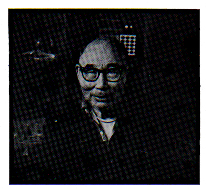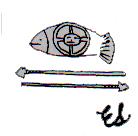 This collection of student work is from Frank Keim's classes. He wants to share these works for others to use as an example of culturally-based curriculum and documentation. These documents have been OCR-scanned and are available for educational use only.
This collection of student work is from Frank Keim's classes. He wants to share these works for others to use as an example of culturally-based curriculum and documentation. These documents have been OCR-scanned and are available for educational use only.Special | A | B | C | D | E | F | G | H | I | J | K | L | M | N | O
P | Q | R | S | T | U | V | W | X | Y | Z | ALL
Dick Bunyan:
Dick Bunyan I was born here at Hooper Bay. And I was baptized after growing up. That was when the priest was gone for a long time, and then when he got back he baptized me. My life was not like the way we are living today. People didn't have stoves like we do now. Only a few people had wood stoves. They used to use cans for stoves, and the tops of washing machines were used as stoves too. They opened their seal gut windows and then burned the stove and let the smoke go out through the window. Everybody was short of things then -- not the way we are living now. In sumertime they never used to wear boots or shoes; they only walked bare foot until the ground got cold. Then they put on their piluguks. Everybody began running out of food in the midwinter months. We didn't have the food around like we do now. They didn't have as much bread in those days as they do these days -- only once in awhile. Then they used to hunt seals only by kayak and harpoon, and they used to catch needle fish, black fish and white fish in wooden traps. Nowadays they use wire traps. And they used to share food with those who had no food. They used the warm furs from foxes, rabbits, and other animals. They used to have large skin boats, and only women would paddle them when they went berry camping. The men would paddle their kayaks when they went to berry camp and when they went hunting. Women wouldn't use kayaks except to go a short ways.
| ||||||
|









